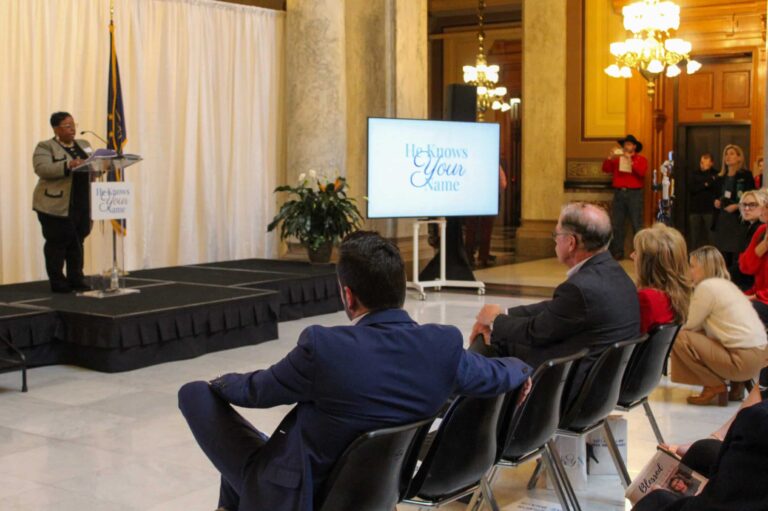
By Marilyn Odendahl
The Indiana Citizen
November 21, 2025
While marking the 25th anniversary of Indiana’s Safe Haven Law, which seeks to protect newborns, Linda Znachko, a champion of the statute, told state lawmakers that the recent discovery of a deceased baby found abandoned in an Indianapolis park shows more work needs to be done.
Znachko, founder of the He Knows Your Name ministry, based in Indianapolis, commemorated the passage of the Safe Haven Law at a special event in the Indiana Statehouse on Tuesday, Nov. 18. She was joined by several dignitaries, including Gov. Mike Braun and his wife, Maureen; Marion County Coroner Alfarena McGinty and Republican legislative leaders, Senate President Pro Tempore Rodric Bray and House Speaker Todd Huston.
The Safe Haven statute allows parents to turn over their infants to first responders or medical personnel anonymously and without fear of legal consequences. Initially signed into law in 2000, the statute has been amended several times to permit baby boxes to be installed at hospitals and certain fire stations, allow parents to surrender their baby at the hospital after delivery, and expand the time parents can give up their newborn without facing legal consequences from 30 days after the birth to 60 days.
McGinty said the Safe Haven Law “has not only saved lives, but has given dignity, identity and compassion to the tiniest among us.”
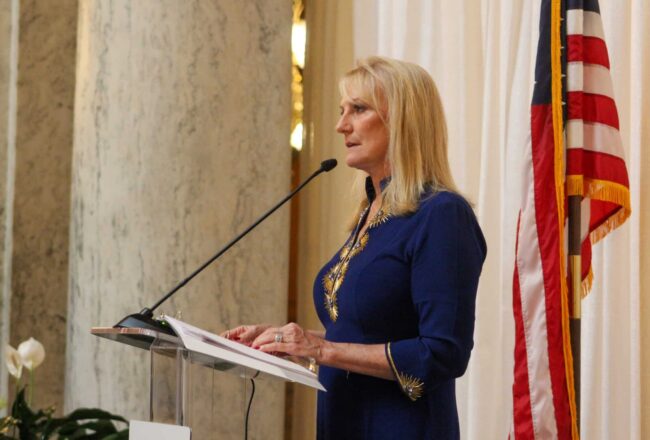
The law, according to Znachko, had put Indiana on an 11-year streak of “no deceased, abandoned babies,” but that ended on Labor Day weekend, when a newborn girl, since named Haven Grace Hope, was found dead in Brookside Park on the east side of Indianapolis. Znachko believes Baby Haven’s mother “fell through the cracks,” because she did not know she could safely surrender her infant.
Consequently, Znachko is calling on the Indiana General Assembly to require more education about the Safe Haven Law, especially for middle and high school students.
“Today, in this historic house surrounded by leaders and authority, I’m asking you all to stand with me – not in theory, not from a distance, but shoulder to shoulder – for the next legislative session,” Znachko said to the crowd. “I would like to see … no mother be alone in fear ever again not know her rights under the law. Baby Haven was found 15 minutes away from two Safe Haven Baby Boxes. I can’t imagine how that happened. (The mother) didn’t know. So let this be the day, right here and right now, where Indiana says, ‘No more.’”
Although neither Bray, R-Martinsville, nor Huston, R-Fishers, mentioned adding an education provision, they did express strong support for the Safe Haven Law.
Bray said the law is part of the state’s pro-life stance that includes a near-total ban on abortion and tax cuts and benefits to help pregnant women as well as new mothers and their babies. In noting that the number of baby box locations has been growing, particularly in smaller communities like Greencastle, Spencer and Bargersville, he said the death of Baby Haven shows the work to protect newborns is never done.
“So education of this law must continue and increasing the number of Safe Haven (Baby Box) locations has to continue to expand so we can improve access to all mothers …when they find themselves in an extremely difficult situation,” Bray said.
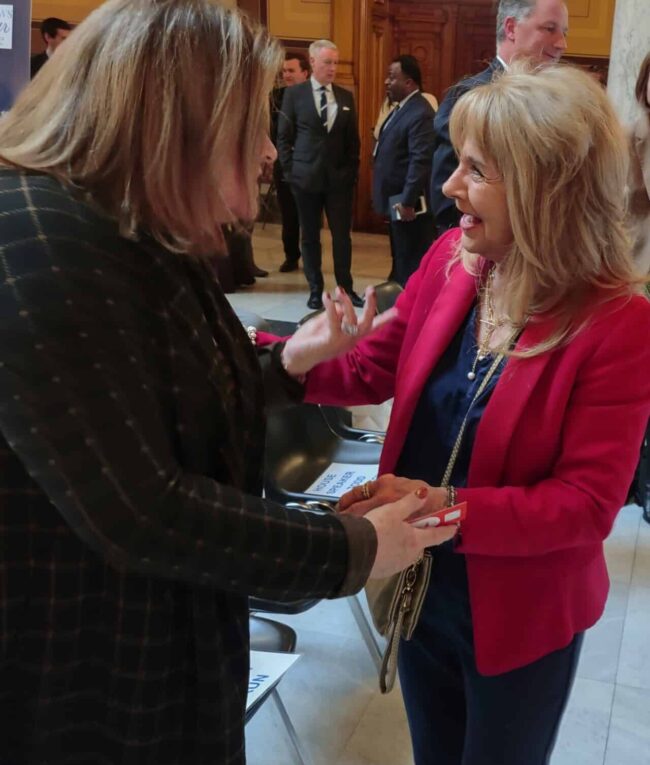
Braun also pointed to Baby Haven and said the state needs to do everything it can to help nurture families and help parents when they become desperate and abandon their infants.
“That means we need to even do a better job of getting the message out there,” the Republican governor said. He added he wants Indiana to start a new record of no deceased, abandoned newborns, so Baby Haven “doesn’t happen ever again.”
Amendments to the Safe Haven Law and the law, itself, have been driven by the discovery of abandoned babies.
Baby Ephariam, found dead from hypothermia in January 2000, a short distance from the entrance to the emergency room at Community Hospital North, prompted former Sen. Jim Merritt to advocate for the Safe Haven Law. Merritt said the hospital was in his district and the place where the body was discovered indicated Baby Ephariam had been left there alive, because the snow under his body had melted.
Senate bills 424 and 426, which included Safe Haven language, were then quickly introduced in the legislature but neither received a hearing, according to legislative records. Merritt, a Republican, credited Rep. Sheila Klinker, D-Lafayette, with saving the legislation by successfully proposing an amendment that inserted the Safe Haven provisions into Senate Enrolled Act 330, which pertained to foster parenting. That bill passed with strong bipartisan support and was signed into law on March 17, 2000.
Speaking after the 25th anniversary event, Merritt said the difficulty in getting the law passed was related to its counterintuitive nature. Normally, he said, laws establish how the government is going to clean up a mess, but the Safe Haven Law sought to avoid tragedy by allowing parents to abandon their babies with no questions asked.
The obstacle in building support initially for the law, he said, was sidestepping some of the state’s adoption laws. Legislators feared without the restrictions, some abusive parents might surrender their baby and escape being held accountable, but Merritt told his colleagues that would still help to prevent children from being harmed.
“So it’s (a) counterintuitive part of public policy, something that I really worked hard on,” Merritt said, noting the legislature has since passed similar laws, such as allowing for needle exchanges to prevent the spread of communicable diseases. “It took a lot of effort in that regard.”
The expansion of the Safe Haven Law in 2017 to allow baby boxes came after the death of Baby Amelia. Znachko said at the funeral for the infant, she met Monica Kelsey, who offered baby boxes as a solution. The containers are installed in exterior walls of fire stations or hospitals and are temperature-controlled and equipped with silent alarms to alert first responders a infant has been left.
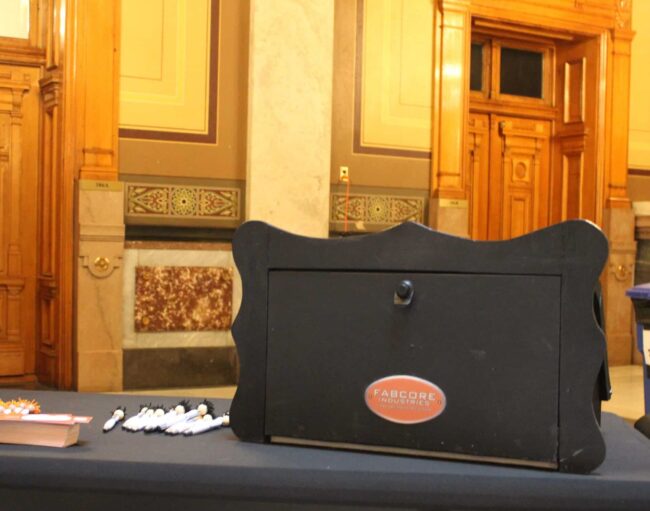
Kelsey had developed a prototype, and now runs the Indiana-based Safe Haven Baby Boxes organization, which promotes the installation of the units for parents who want to remain completely anonymous when giving up a child, rather than handing the newborn in person to a firefighter or medical professional.
Kelsey spoke at the anniversary event and said that while the “first and most personal recommendation” is surrendering the child to another person, the baby box “remains a vital second option” for parents. Also, as she noted that her nonprofit offers a crisis hotline for mothers, she, too, asked for help in raising awareness.
“It is a lifeline and it deserves to be amplified,” Kelsey said. “So I ask you, our legislators, our leaders, to share the hotline. Share the mission of Safe Haven Baby Boxes. Put it in your newsletter, talk about it in your town halls, your churches on Sunday, because every time that a Safe Haven Baby Box is shared, a door opens for a mother who may feel like she has nothing.”
Merritt said the education component would have to be provided by the private sector, because teaching students and making the public more aware of the Safe Haven Law will likely cost money and the General Assembly will not be considering budget issues again until the 2027 legislative session.
Carmel Mayor Sue Finkam attended the anniversary event and spoke with Merritt afterward. Pointing out that her city has benefited from the Safe Haven Law and baby boxes, she has offered to help mayors of other cities in other states understand how the statute works and how to get one enacted.
“I do believe education is important,” Finkam said, adding that sometimes the “most basic city regulations and state regulations” can be difficult to understand. “This is certainly one that’s a little more unusual and a little more uncommon, and so it behooves us all to continue talking about it to make sure that, again, no baby is abandoned.”
Last month, Znachko, whose organization strives to make sure every child receives a name and is afforded dignity and honor in death, held a funeral and graveside burial for Baby Haven at Washington Park East Cemetery in Indianapolis.
As the crowd was eating cake following the speeches at the Safe Haven Law ceremony, Znachko was reluctant to say that 25 years in, the Safe Haven Law was what she had envisioned. Rather, she described the law as a journey that is continuing through the amendments that have expanded the scope of the statute to address the needs that keep arising.
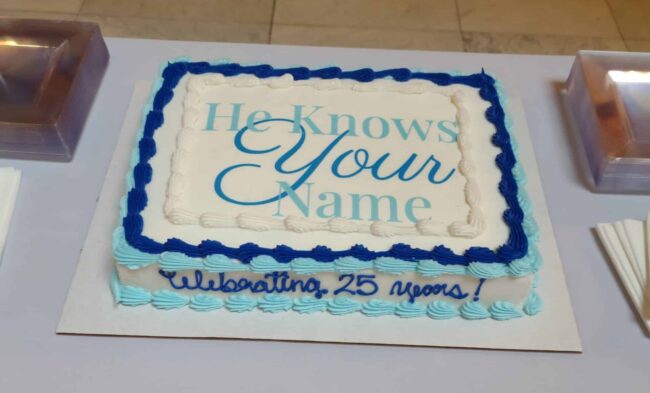
The current need of education, Znachko said, is “exclusively the legislative role right now.” She said the middle and high school students she has interacted with are eager to learn, and, since they are already being taught how to administer CPR and how to care for their own mental health, a component on the Safe Haven Law could easily be added to the curriculum.
Znachko said she has been talking to legislators and looking for “someone to quarterback” a Safe Haven education provision through the General Assembly.
“We thought that the law put in place then was … the answer, but it was an answer in the moment,” Znachko said. She added that a year after the Safe Haven Law was enacted, another baby was found abandoned and that made her and the law’s supporters realize more needed to be done. “No one knew about the law. You can’t just put a law in place … and think you’re done and wash your hands of it and say, ‘Now everyone’s going to be better.’”
Dwight Adams, an editor and writer based in Indianapolis, edited this article. He is a former content editor, copy editor and digital producer at The Indianapolis Star and IndyStar.com, and worked as a planner for other newspapers, including the Louisville Courier Journal.
The Indiana Citizen is a nonpartisan, nonprofit platform dedicated to increasing the number of informed and engaged Hoosier citizens. We are operated by the Indiana Citizen Education Foundation, Inc., a 501(c)(3) public charity. For questions about the story, contact Marilyn Odendahl at marilyn.odendahl@indianacitizen.org.